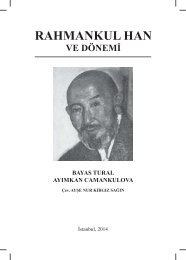THE SOVIET HISTORIOGRAPHY AND THE QUESTION OF KAZAKHSTAN’S HISTORY
SOVYET-TARIH-YAZICILIGI-ENG
SOVYET-TARIH-YAZICILIGI-ENG
You also want an ePaper? Increase the reach of your titles
YUMPU automatically turns print PDFs into web optimized ePapers that Google loves.
<strong>THE</strong> <strong>QUESTION</strong> <strong>OF</strong> <strong>KAZAKHSTAN’S</strong> <strong>HISTORY</strong> 205<br />
realm. Because of that, pro-Tatar side accused the pro-Bulgarian side<br />
of weakening the Tatar national movement. 390<br />
Certain points about post-Soviet pro-Bulgarian movement (Neo-Bulgharism<br />
as Allen J. Frank proposed) require attention. On the one hand,<br />
as Frank emphasised, this movement reiterated the positions of Soviet<br />
historiography by completely ignoring the original religious essence<br />
of the “Bulgarian” identity. On the other hand, this new movement<br />
overlooked the reality of Soviet political manipulation complained by<br />
the pro-Tatar side. In this regard, Frank assesses the new pro-Bulgarian<br />
movement as a “peculiar Soviet phenomenon”. 391 However, we have<br />
to assert that regarding this movement as a mere product of Soviet<br />
ideology would be wrong. As understood from the ideas of prominent<br />
pro-Bulgarian historian Ebrar Kerimullin, the reason behind the calls<br />
for the adoption of the name “Bulgarian” instead of “Tatar” stemmed<br />
rather from the negative image of “Tatar” as a result of Soviet legacy.<br />
In this sense, the neo-Bulgarian movement can be seen as a reaction<br />
to the Soviet policies (the expression of the negative feelings accumulated<br />
during the Soviet period).<br />
In conclusion, this neo-Bulgarian movement could only affect a<br />
limited part of Tatar community. The pro-Tatar movement that was<br />
busy with the uncovering and absolving of the accusations against<br />
the Tatar history during the Soviet period (especially the Khanates<br />
of Golden Horde and Kazan) found much more supporters. During the<br />
rewriting process of the Tatar history’s defamed and lost pages, the<br />
Tatar name was also exonerated.<br />
Taking everything into consideration, we have to also note that<br />
a consensus was not attained on the Tatars’ ethnic question among<br />
the Tatar society. Published in 1999, the Tatar Encyclopaedic Glossary<br />
avoided precise remarks about the Tatars’ ethnic descent and listed<br />
three different positions about this delicate issue: pro-Bulgarian,<br />
pro-Tatar-Mongol and pro-Turkish-Tatar. 392 Studies and research on<br />
the Tatar national history continue today as well.<br />
390 Frank, ibid, p. 186-192; Fehretdinov, R. G. Tatar Uglı Tatarmın, Yar Challı, 1993,<br />
pp. 3-4.<br />
391 Frank, ibid, pp. 184; 199-200.<br />
392 Tatarskiy entsiklopediçeskiy slovar, p. 566-567.



